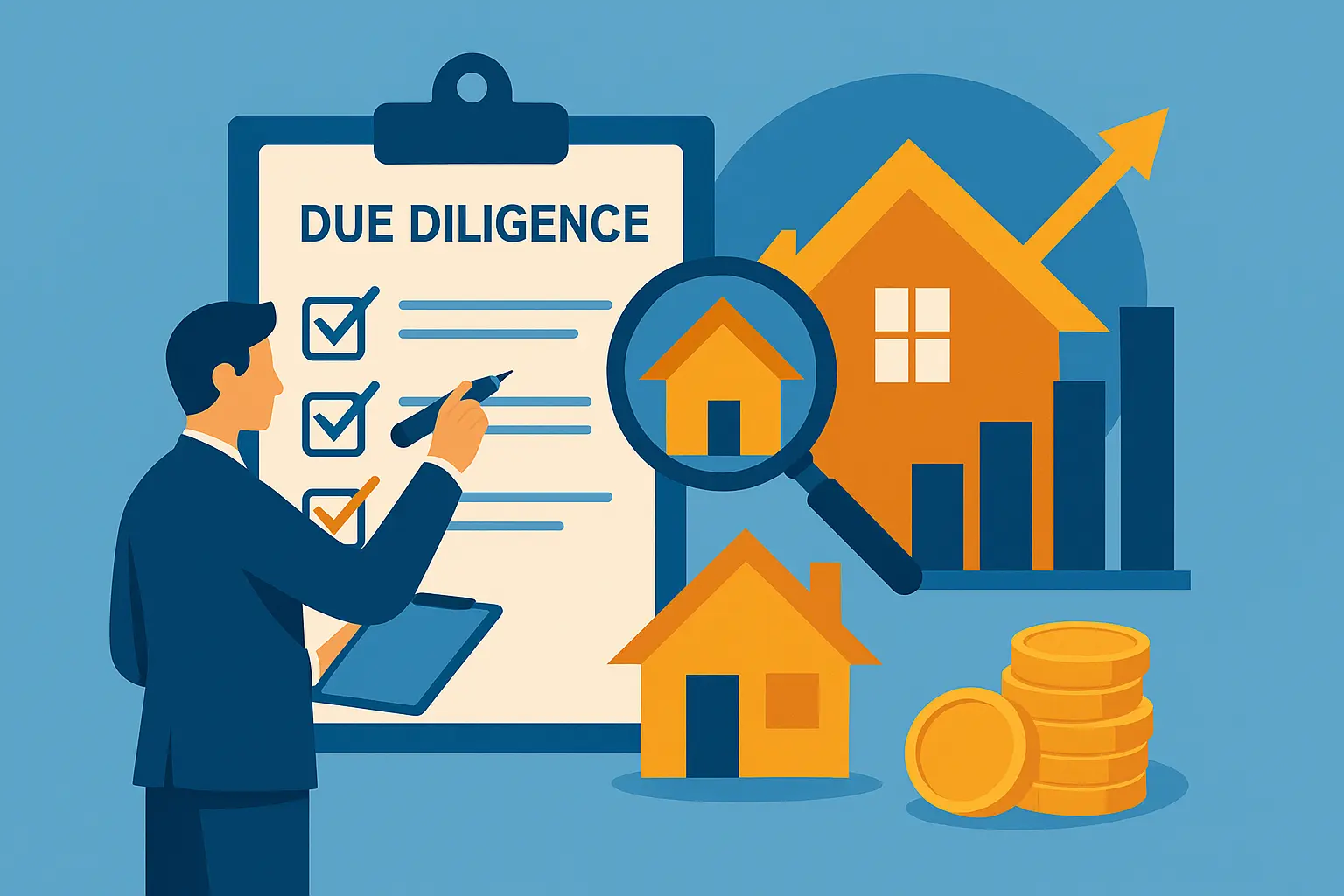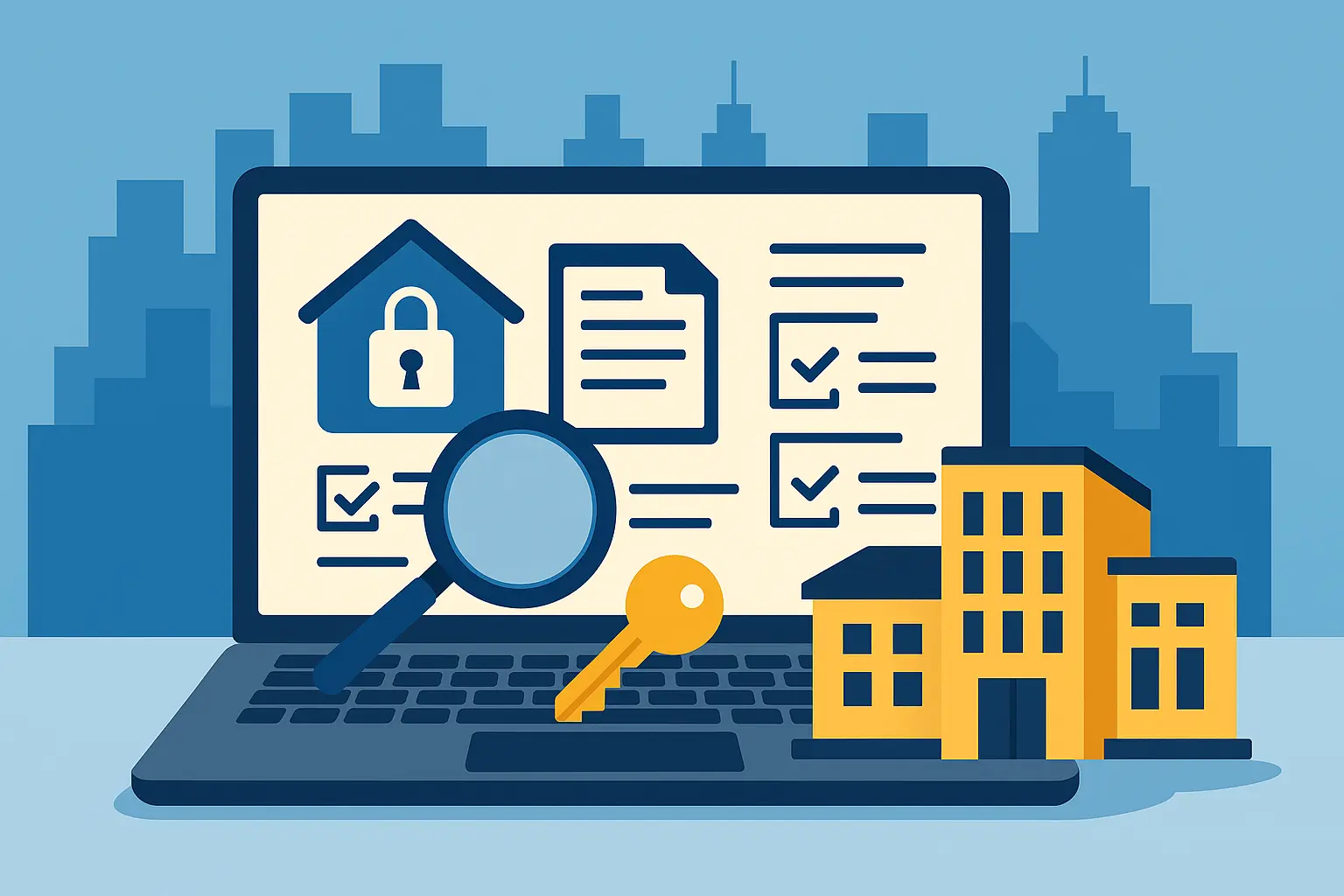Why Real Estate Due Diligence Is Non-Negotiable
The American Land Title Association has noted that 25% of real estate deals uncover title issues at the due diligence stage, from minor zoning problems to hidden liens. Doing a proper review helps the prospective buyer avoid potential liabilities or legal risks that can adversely affect the investment.
Before signing a purchase and sale agreement, thorough property due diligence involves verifying details and identifying potential risks. You should review legal documents, inspect the property’s condition, examine its financial obligations, including property taxes, research zoning regulations, and take any necessary additional steps. Investors need to know the difference so they don’t acquire a disguised financial problem, especially when dealing with an income-producing property or complex transactions.
This article will focus on due diligence for real estate, its role in real estate transactions, possible challenges, and technologies that simplify the whole process.
What is the Due Diligence Process in Real Estate?
Basically, due diligence for real estate transactions covers checking all the essential paperwork, expenses, and features of the property before buying it. Checking all details before making an offer can save you from any problems and protect your money in real estate buying or investing.
This step involves inspecting titles, local zoning laws, verifying any required building permits, performing financial reviews, and other tasks to ensure the deal supports your plans.
Residential vs. Commercial Due Diligence
Depending on the type of property being traded, the due diligence process has a typical due diligence period and unique requirements. The two types of situations require careful evaluation, but the scale of the investigation differs a lot.
| Category | Residential Due Diligence | Commercial Due Diligence |
|---|---|---|
| Focus | Individual buyers/homeowners | Investors, corporations, and private equity firms |
| Typical Documents | Title report, property disclosures, inspection report, and homeowners association documents | Lease agreements, rent roll, financial statements, payment schedule, expense statements, zoning letters, and environmental reports |
| Physical Inspections | General home inspection, pest, roofing, and HVAC checks | Structural inspection, fire safety, HVAC, parking, ADA compliance |
| Legal & Regulatory Checks | Local code compliance, HOA rules | Real estate compliance checklist, zoning & land use, licenses, easements |
| Financial Review | Mortgage terms, taxes, and insurance | Net Operating Income (NOI), cap rate, cash flow, TTM financials |
| Key Tools/Resources | Buyer’s agent, attorney, inspector | Commercial real estate due diligence checklist, attorney, broker, real estate due diligence companies |
| Common Risks | Undisclosed defects, title issues | Environmental liabilities, lease disputes, and misrepresented income |
| Checklist Reference | Due diligence buying a house, real estate audit checklist | Due diligence checklist for commercial real estate, commercial property due diligence checklist |
What is due diligence in real estate? Understanding is essential for both individuals and institutional investors. Arranging the due diligence documents and applying modern real estate due diligence software solutions guarantees that all important information will not be missed.
Why Due Diligence is Crucial in Real Estate Transactions
If real estate due diligence is not done when buying real estate, you may face costly problems, legal disputes, or find that your investment does not make enough money. Buying a home or a commercial property, not paying enough attention to the details, might bring you the following problems:
- Issues as liens, differences in land boundaries, or the wrong type of zoning that have not yet been exposed
- False projections of earnings because of careless lease evaluation or dishonest financial reports
- Types of environmental risks that must be fixed at great expense, mostly in businesses.
- Failing to follow the proper regulations and codes in that area, breaking the standards in the real estate influencer guidelines
- Buying things that are not related to your main business or what you invest in
Such risks are increased in deals involving larger or cross-border transactions, where the due diligence checklist for commercial real estate has many complex and codependent factors.
Benefits of Proper Due Diligence
Alternatively, a well-organized real estate due diligence checklist delivers the following key benefits:
- Risk mitigation. It helps buyers discover potential risks, allowing them to work out a new deal or drop the offer.
- Informed decision-making. Makes it possible to understand the property’s legal, financial position, and its physical condition.
- Regulatory compliance. Checking for regulatory compliance keeps all your documentation, disclosures, and inspections on track for your audit.
- Investment confidence. Ensures the asset passes your real estate investment research to help with creating long-term value.
- Valuation accuracy. It helps confirm the price assumptions and match expectations with the market size and other local properties.
Professional investors collaborate with real estate due diligence companies and use digital tools to make the process smooth and equal across every deal.
Real Estate Due Diligence Process
Conducting a real estate due diligence process is vital for good investment choices and helps avoid any sudden surfacing liabilities. For a single deal or a bigger real estate portfolio, the due diligence process usually has two major phases: pre-offer and post-offer checks.
Pre-Offer Due Diligence
Once buyers start looking for a property, pre-offer due diligence allows them to identify potential deal-breakers. At this point, it is necessary to learn about zoning, nearby markets, environmental details, and what can or cannot be used on the phase. During this step, you can apply property investment technology to speed up analysis and identify any issues earlier through automated risk assessment tools.
A land due diligence checklist or buyer due diligence checklist is important for a detailed analysis and can assure that no major issues are missed. Pre-offer research establishes good prices and avoids considering properties that will not work out in the end.
Post-Offer Due Diligence
When the offer is accepted, the post-offer process is more detailed. This phase involves a comprehensive review of due diligence documents real estate professionals must examine, including rental contracts, titles, taxes, and service agreement papers.
Many professionals in the industry now rely on real estate software providers offering cloud-based solutions, which streamline diligence work, document review, and risk assessment, for example, a due diligence data room, ensuring efficient document management, secure file sharing, and centralized data management. The workflow is easier to manage using these tools, particularly in situations involving multiple stakeholders.
| Discover how virtual data rooms simplify commercial real estate due diligence: The Ultimate Guide to Using a Real Estate Data Room for Property Deal |
As a part of the post-offer process, modern platforms provide users with real-time transaction monitoring features to ensure adherence to real estate compliance standards, ensuring compliance with state law, zoning laws, and the Americans with Disabilities Act. A real estate development due diligence checklist may be useful if the property involves construction, permitting, or redevelopment considerations.
With digital transformation taking hold in the real estate industry, doing due diligence is not just about using spreadsheets and files. New technology provides structure, speed, and security that help investors complete due diligence with ease.
Let’s focus more on the due diligence files in the real estate industry.
What are Due Diligence Documents in Real Estate
Evaluating a property in real estate depends heavily on due diligence documents. The gathered and studied materials are organized into a due diligence report, which helps buyers, investors, or stakeholders in deciding whether to sign an agreement. By examining these documents, one can review the property’s finances, ownership status, and current condition before signing any deal.
For easy organization, due diligence documents are categorized into three main areas.
Financial Due Diligence Documents
These documents help verify the income and expense profile of a property. Common examples include:
- Rent rolls and lease agreements
- Operating expense reports and utility bills
- Tax records and assessments
- Loan documents and debt schedules
- Service contracts and vendor agreements
Reviewing these items helps validate the asset’s revenue potential and identify any financial red flags.
Legal Due Diligence Documents
Legal documents ensure the property is free of encumbrances and compliant with applicable regulations. These may include:
- Title deeds and ownership certificates
- Easements, liens, and encumbrance records
- Zoning verification letters
- Licenses, permits, and land use approvals
- Litigation history or pending legal claims
Clear legal documentation helps avoid future disputes and ensures a clean transfer of ownership.
Physical Due Diligence Documents
These records provide insights into the condition and functionality of the physical asset. Key documents include:
- Inspection reports (structural, mechanical, electrical, etc.)
- Environmental assessments and hazard disclosures
- Maintenance logs and repair histories
- Code compliance certifications
- Site and utility maps
For land or development deals, additional items are used to assess factors such as soil quality, flood risk, and access infrastructure.
Due Diligence for Different Property Types
Every case of due diligence requires different efforts. The property you are planning to buy requires you to change the scope of your research accordingly. Consider the special issues involved in each category, no matter if you buy a home, a commercial building with many tenants, or just land.
Residential Properties
Checking real estate for a home is usually easier, but don’t overlook its importance. The main steps are:
- Title and ownership verification. Assure that the seller owns the property clearly and without any doubt. Verify that there are no liens or encumbrances that can affect the property you are buying.
- Property condition. Hire an experienced inspector to examine the house’s structure, as well as inspect the heating and ventilation, plumbing, electricity, roof, and possible problem areas such as mold, radon, and pests.
- Neighborhood and market analysis. Don’t forget to check the crime rates, how the neighborhood rates schools, transportation options, and what kind of trends the neighborhood has been showing. Study other homes that are being sold nearby to get a proper idea of value.
- Zoning and land use compliance. Ensure that the way you plan to use the property follows the current zoning rules in your area. Be confident that your plans are allowed by the community HOAs or by the city.
- Financial review. Check the amount of taxes, insurance, and the repairs the property might need in the future. Examine how much money you can make from rent when buying a property to invest in.
Commercial Properties
Key due diligence considerations are:
- Lease review and tenant analysis. Examine all current leases, the tenants’ paying history, and the rate of occupancy. Ensure you are aware of the lease terms and all the tenant’s duties.
- Financial performance. Go through the income statements, balance sheets, rent rolls, and net operating income (NOI) of the building. Ensure that you look into charges such as CAM, utility expenses, and taxes.
- Building systems and code compliance. Check the condition of elevators, fire-fighting systems, central heating, air conditioning, ADA guarantees, and safety standards.
- Zoning and licensing. Ensure that the way the building is used follows the city’s zoning guidelines. Ensure that all required licenses or permits are obtained, depending on the business running onsite.
- Environmental and legal risks. Undertake a Phase I Environmental Site Assessment to find any contamination. Check for any current or previous lawsuits or claims against the property.
Land and Development Projects
The due diligence includes:
- Environmental and geotechnical reports. Assessments of the soil, possible environmental hazards, flood danger, and the identification of wetlands help ensure that the construction process is doable and follows all regulations.
- Infrastructure and services. Check if the new place has roads, sources of water, working sewers, electricity, and internet. If you can’t reach resources, it may increase the time and money needed for your work.
- Market feasibility. Check the level of demand, the number of competitors, and how profitable the business can be. Ensure that choosing residential, commercial, or mixed-use development will give you the best profit.
- Legal and title issues. Check who owns the property and learn about land conflicts or legal agreements that can influence any planning.
Due diligence takes different forms and can change from one situation to another. There are unique issues and advantages for every kind of property. A good due diligence process:
- It keeps businesses protected from possible risks and expenses.
- Publish assumptions about how the operations and investments will be carried out
- Allows stakeholders to feel confident while deciding on important matters
- Whether you are involved in buying, selling, advising, or investing, proper due diligence is your biggest strength.
Common Real Estate Due Diligence Challenges
Conducting due diligence on properties is always necessary, but some challenges can cause real estate deals to be postponed or cancelled. Noticing these issues at the beginning and handling them properly can prevent investors, developers, and buyers from facing unexpected problems. The table below reveals the due diligence issues and how to solve them.
| Challenge | Description | Strategies to Overcome |
|---|---|---|
| Incomplete Documentation | Missing or outdated title deeds, surveys, leases, or permits |
|
| Hidden Liabilities | Environmental issues, tax arrears, legal disputes, or code violations |
|
| Time Constraints | Limited time to conduct thorough investigations due to the deadline pressure |
|
| Coordination Challenges | Multiple parties are involved, causing miscommunication or delays |
|
Tech in Real Estate Due Diligence
Technology now greatly simplifies the due diligence process for real estate. The large number of documents and jobs involved in property deals are now easily controlled with the help of virtual data rooms and checklists. Storing and sharing important information in a virtual data room provides every stakeholder with secure and quick data access.
Digital checklists improve the process, making it complete, easier, and well-organized. Technology in the real estate business helps conduct due diligence with less risk and more efficiency.
Conclusion
Focusing on thorough due diligence plays a key role in reaching successful property transactions. It reveals possible risks, helps companies maintain compliance, and gives buy-side the confidence to make decisions. A thorough check of a property in all its aspects makes it much easier for investors to recognize risks and negotiate advantageously.
Refer to the checklist whenever you undertake your due diligence process. Still, relying on professionals like attorneys, inspectors, and financial advisors is necessary to avoid missing important details in your evaluation. Spending time to do your work well now can protect you from major issues later on.
Top Data Room Providers for Real Estate Due Diligence
iDeals
- Granular access permissions
- Audit-ready document tracking
- Secure Q&A and collaboration tools
- Comprehensive reporting features
DealRoom
- Real estate diligence checklists
- Secure file collaboration
- Built-in task management
- Version control for contracts
Intralinks
- Enterprise data security
- AI-powered document tools
- RE transaction templates
- Mobile app support
SecureDocs
- Instant setup & low pricing
- Investor-ready rooms
- Permission-based access
- Audit logs for RE deals
Datasite
- Real estate analytics tools
- Flexible access rights
- AI-powered search & redaction
- Trusted by brokers & firms



